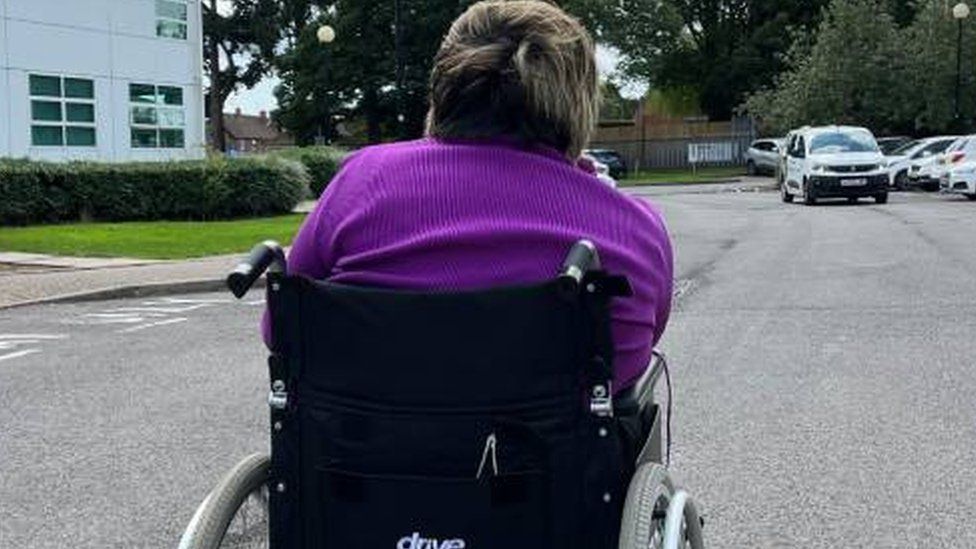
“Now I’m serving a prison sentence and he’s free to do it again – how is that justice?” says Victoria
By Peter Gillibrand
BBC News
A deaf and partially sighted woman says she has not left home by herself for three years after being assaulted.
Victoria – not her real name – was recovering from an abusive relationship when she became a victim of a disability hate crime.
The man convicted of attacking her is now free from jail, and Victoria feels like the one who is imprisoned.
The Home Office said police had to take disability hate crime “extremely seriously”.
“He got 12 weeks, I’m still serving a three-year prison sentence,” Victoria said of the stranger who attacked her in 2020.
Describing the assault, she said: “He started dragging me. Saying abusive stuff about how much he hates disabled people.
“I was trying to bite and was getting more and more scared. I knew that he was taking me to either rape or kill me.
“Luckily, a woman stopped her car and got out and helped me.”
The man who assaulted Victoria was sentenced to 12 weeks in prison, and the court heard she was targeted because of “her vulnerability”.
“I had fought so much to get my independence. I thought I could at least now have a chance to live life,” she said.
“I wake up having flashbacks. He really wanted to hurt me. Now I’m serving a prison sentence and he’s free to do it again – how is that justice?
“I haven’t been out of my home [alone] for three years. My health has now deteriorated and I’m in a wheelchair.”
Victoria said she was too scared to leave the house because of what she feels is a “complete hatred of disabled people”.
“People have such aggression towards you,” she said.
“(I was) just trying to live life and now I’m so scared that I can’t go outside my door for fear of being attacked – for just being a human.”
Disability hate crime incidents in Wales have more than doubled between 2017 and 2022 – with 3,849 incidents reported to police.
Over those five years, 3.7% of the incidents ended in a charge or summons, compared with 12% of all hate crimes.
Dr Erin Pritchard from Bangor, Gwynedd, who has dwarfism, said: “I’ve been picked up by people… it’s the name calling, the staring, the laughing – it’s constant.
The senior lecturer at Liverpool Hope University said she has experienced “constant calling of the word ‘midget’ and there’s no point reporting it because nothing will be done”.
“A lot of people with dwarfism tend to stay indoors. I’ll just go out when it’s quiet,” she added.
Dr Pritchard said she was even once asked by a woman if she could hire her for a party.
In 2022, she ran a successful campaign to change the name of Midget Gems sweets in some supermarkets.
Image source, Dr Erin Pritchard
Dr Erin Pritchard has campaigned for equality for disabled people
“There’s a lot of racism and homophobia still going on, but with disabled hate crime it’s like it’s not as important,” she said.
“If you call someone from an ethnic minority a certain name it’s taken with more seriousness than with disablist hate.
“With disability it has to be something so serious like being beaten up before it’s taken seriously.”
Prof Mark Walters from the University of Sussex is a Home Office adviser, and said he has been told hate crime is “not a priority” by the UK government.
He said disability hate crime was treated differently in the law, compared to racially or religiously aggravated assaults, meaning maximum sentences were significantly lower.
“If there’s disability hostility in an assault, you cannot go beyond six months imprisonment,” he said.
Image source, University of Sussex
Prof Mark Walters calls for parity in the law across all protected characteristics
“Whereas if it’s racially aggravated, you’d be prosecuted at the start of the trial and the judge could give you up to two years. [There’s] a hierarchy of hate.”
Becca Rosenthal of Victim Support Wales said there were barriers to reporting such crime, as well as lack of evidence issues, and a low take-up of prosecutions.”There’s certainly a lack of trust with policing,” she said. “A lot of people hold back.”There’s certainly a shift in society around this push-pull between freedom of speech and freedom from harm.”
The National Police Chiefs’ Council said more victims than ever before were coming forward.
However, it said there is more to be done when it comes to disability hate crime, having previously admitting to “a need to make further progress”..
The Home Office said it expects police to take hate crime extremely seriously.
“Hate crime, including disability hate crime, is a scourge on communities across the country and does not reflect the values of modern Britain,” a spokesperson said. “We expect the police to take these abhorrent crimes extremely seriously and work with the CPS to ensure perpetrators are prosecuted and victims receive justice.”
The spokesperson claimed the biggest drive for the increase in hate crime is improvement in police recording, and more people coming forward.








